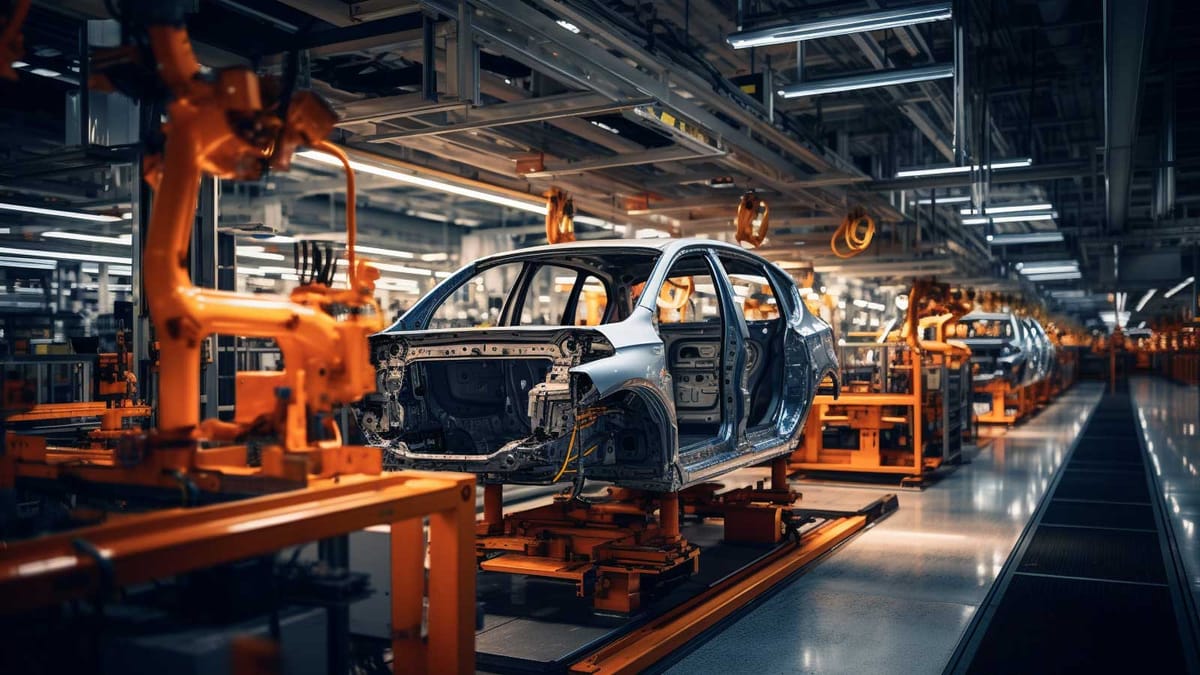The Stupidity Will Continue Until Morale Improves
Trump’s 25% auto tariff is an economically illiterate, self-defeating tax on Americans disguised as patriotism.

Donald Trump's announcement of a 25% tariff on imported vehicles is another shortsighted, counterproductive, economically illiterate policy that will harm American consumers, workers, and businesses in pursuit of a vaguely defined goal that may or may not exist. This latest, poorly aimed salvo in Trump's expanding trade war shows his administration's chronic and profoundly stupid misunderstanding of global economics and manufacturing supply chains.
The president's declaration that he would impose "punitive tariffs" on imported cars - all while potentially offering China tariff reductions to secure, of all things, a TikTok deal - encapsulates the incoherent, Quid-Pro-Bro approach that has come to define his administration's economic buffoonery. It's monetary policy by impulse – divorced from strategy, evidence, or consistency.
These auto tariffs are a regressive tax on American consumers. When importers face higher costs due to tariffs, they pass them on to buyers. The average price of new vehicles – already at record highs – will climb further, placing them beyond the reach of working American battlers. Used car prices will follow as demand shifts to that market. This isn't speculation - it's basic economics. I.E., well beyond the grasp of either Donald Trump or his ill-advised advisors.
Trump's slurred justification for these tariffs – that they will somehow protect national security and revitalize American manufacturing – lacks any credible supporting evidence. The 2019 national security investigation that Trump is fumbling with to justify these tariffs was widely criticized at the time as a transparent attempt to bypass Congress's authority over trade policy. He's dusting off this questionable legal justification to impose an arbitrary tax increase on American consumers during a period when working folks are already struggling.
The president's further willingness to use tariff threats as a bumbling form of outdated "Art of the Deal" leverage in completely unrelated negotiations is the clearest sign that he doesn't understand tariffs as a financial instrument.
Trump:
"With respect to TikTok, and China is going to have to play a role in that, possibly in the form of an approval, maybe, and I think they'll do that. Maybe I'll give them a little reduction in tariffs or something to get it done."
This transactional approach to international trade undermines the integrity of the global trading system and America's already shredded and stained credibility abroad, weakening its position at any negotiating table.
Canadian Prime Minister Mark Carney has already signaled retaliatory measures, calling Trump's auto tariffs "a direct attack" and convening his cabinet to respond. European officials will undoubtedly follow suit. The unsteadily, unpredictably escalating trade conflict has now spiraled into a full-blown trade war between America's closest allies and its largest trading partners.
The world has seen and laughed at this policy failure before. Trump's first term featured similarly flimsy, barely-thought-through tariff threats and implementations, which economists widely agreed had damaged the American economy while failing to achieve their stated objectives. Manufacturing jobs didn't surge; they continued their long-term structural decline. Trade deficits didn't shrink; they expanded. Consumer prices rose, effectively implementing a regressive tax on American households. And here we are again, watching America's Dotard double down on the same FUBAR of a strategy.
The auto industry has repeatedly warned about the destructive impact of the exact tariffs Trump just unceremoniously dumped on his desk. Today's vehicles aren't "made in America" or "made overseas" – they're the product of complex global supply chains with components crossing borders multiple times before final assembly. A car assembled in South Carolina might contain parts from Mexico, Canada, Japan, and Germany. The reverse is equally true – many "foreign" cars contain substantial American components and engineering. Disrupting these supply chains with punitive tariffs will - not might, will - increase costs, reduce efficiency, and lead to significant job losses in American auto manufacturing. Meanwhile, the ambiguity surrounding the treatment of parts under the USMCA trade agreement shows how chaotic and untethered this policy really is. It's an added uncertainty that creates additional compliance costs for manufacturers and importers, which—once again—will be paid by Americans.
If protecting American manufacturing jobs is a worthy goal, tariffs are a blunt, ineffective cudgel of a tool that will only produce unintended, damaging consequences. A comprehensive industrial policy focused on workforce development, infrastructure investment, and targeted support for emerging technologies would be far more effective at sustaining American manufacturing than ill-conceived, punitive tariffs. But Trump, a notoriously anti-Union, anti-worker, anti-reality president, is unlikely to deliver anything so substantive or practical.
Framing these tariffs as being paid by foreign countries is fundamentally, deliberately dishonest. Tariffs are taxes paid by importers, which are passed on to consumers through higher prices. When Trump waffles about "China," "Germany," or "Japan" paying these tariffs, he's either demonstrating the fiscal ignorance of a high-school student who slept through Econ 101, or deliberately misleading the American public. Either possibility is disturbing.
Financial markets have already reacted negatively to the announcement, with auto stocks tumbling on tariff shock. This level of market instability will keep on spreading as investors and CEOs—many of whom, in their hubris, backed Trump—worry and fret about an economic disaster largely of their own making.
For all the nationalist rhetoric about protecting American workers, the reality is that American jobs depend on global trade, and Trump cannot wave his tiny hands and alter 100 years of globalization, evolution, and growth. The auto industry relies on the free flow of components and vehicles across borders. Disrupting those relationships with punitive tariffs will decimate those jobs and put thousands of others at risk. The victims of Trump's trade war won't be foreign manufacturers. Like so many of Trump's policies, the victims will be American workers.
The days when cars were built entirely within one country's borders are long gone. Attempting to force a return to an imagined past through tariffs won't create a manufacturing renaissance – it will simply make products more expensive while damaging international relationships built over decades.
America doesn't need tariffs. It needs a coherent, forward-looking industrial policy that addresses the real challenges facing manufacturing workers: automation, skills gaps, and technological transition. Instead, under Donald Trump, all it's likely to get is performative, small-man-syndrome protectionism.
Trump's tariff war isn't making America great again - it's making basic economic goods more expensive, undermining diplomatic relationships, and creating economic uncertainty when stability is desperately needed.
The stupidity will continue until morale improves – or until American voters and policymakers recognize that combative unilateralism and economic nationalism aren't pathways to prosperity. They're dead ends that leave everyone worse off.
Now, more than ever, the world needs an independent press that is unencumbered by commercial conflicts and undue influence.
By taking out an optional founding membership, you can help us build a free, accessible, independent news platform firewalled from corporate interests.
Support The Index


